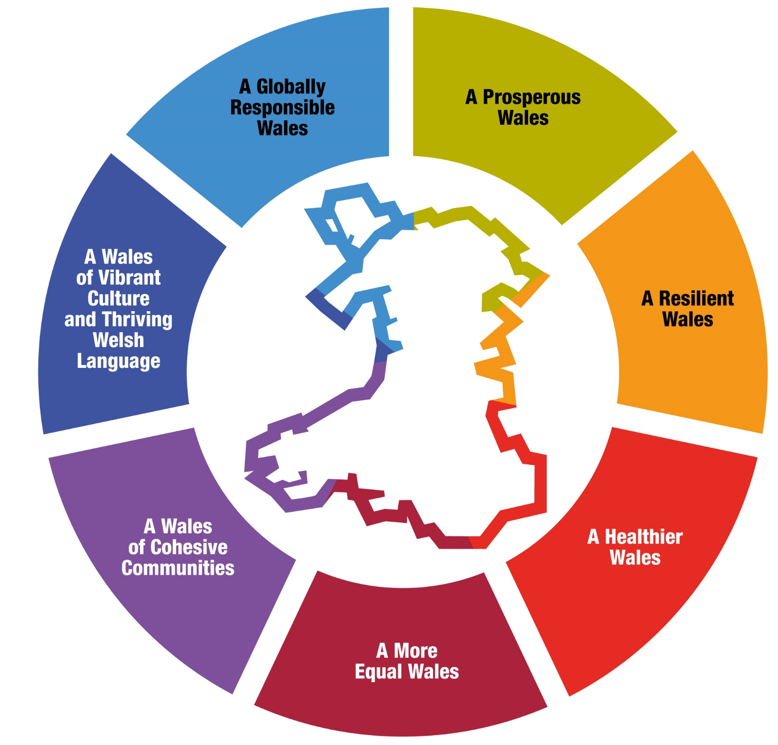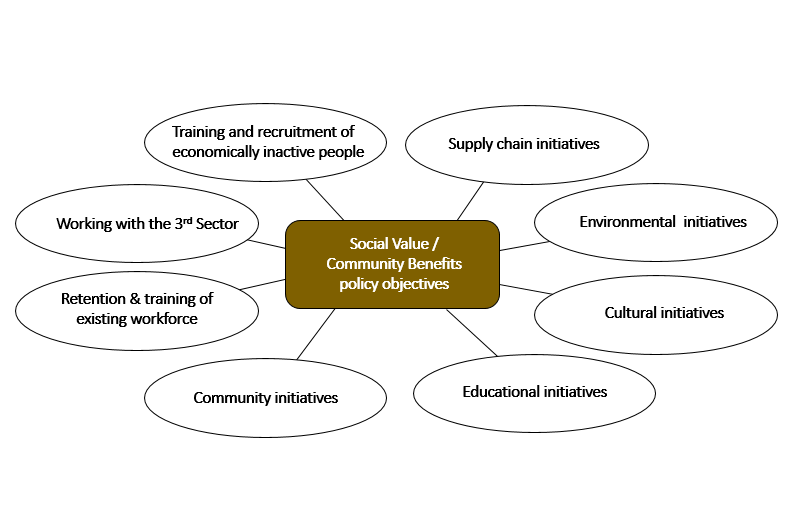WPPN 01/20 Social value clauses/community benefits through public procurement
WPPN 01/20 provides public sector bodies in Wales with advice on the Welsh Government’s overarching policy objectives and the reporting of outcomes in relation to social value clauses/community benefits.
This file may not be fully accessible.
In this page
Well-being of Future Generations Act’s well-being goals supported by this WPPN

- A prosperous Wales
- A resilient Wales
- A healthier Wales
- A more equal Wales
- A Wales of more cohesive communities
- A Wales of vibrant culture and thriving Welsh language
- A globally responsible Wales
1. Points to note
2. Purpose
The purpose of Wales Procurement Policy Note (WPPN) WPPN 01/20 is to provide public sector bodies in Wales with advice on the Welsh Government’s overarching policy objectives and the reporting of outcomes in relation to social value clauses/community benefits. This WPPN covers:
- The Welsh Government’s social value clauses/community benefit policy objectives - see section 7 below
- Reporting of outcomes – see section 9 below.
3. Dissemination and scope
- This WPPN is for the attention of all contracting authorities in Wales, including Welsh Government departments, NHS Wales bodies, Welsh Government Sponsored Bodies, local authorities and the wider public sector. Together, these are referred to in this WPPN as ‘contracting authorities’. This WPPN covers goods, services and works contracts being delivered in Wales.
- Please circulate this WPPN across your organisation and to other relevant organisations that you are responsible for, drawing it to the specific attention of those in procurement, commercial and finance roles.
4. Timing
This WPPN is effective from the date of publication (18th November 2020) until it is superseded or cancelled.
5. Background
When taken as a whole, the Welsh public sector is the largest user of goods and services from both the private and voluntary sectors in Wales, spending some £6.7 billion per year (procurement expenditure analysis 2018 to 2019). Through delivery of public contracts this spending power has the potential to influence market development in the medium to long term and create opportunities to deliver wider socio-economic and environmental outcomes, meeting the needs of the present without compromising the ability of future generations to meet their own needs.
Wherever possible social value requirements proportionate to the value and related to the subject matter of the contract should be considered for inclusion in public sector tenders.
In all cases where a contracting authority determines that social value requirements are to be included:
- Links between social value requirements and Wellbeing of Future Generations (Wales) Act 2015 (“WBFG”) Goals should be identified (where the contracting authority is subject to the WBFG), and
- A minimum weighting of 10% (Procurement Policy Note 06/20 – taking account of social value in the award of central government contracts) of the total award criteria should be applied to social value in the tender to ensure that it carries a heavy enough score to be a differentiating factor in bid evaluation.
Taking these opportunities has never been more important and doing so is fundamental to meeting the requirements of the Wellbeing of Future Generations (Wales) Act 2015 (for further information see the Wellbeing of Future Generations Essentials Guide) and Socio-Economic Duty that ‘will require specified public bodies, when making strategic decisions such as ‘deciding priorities and setting objectives’, to consider how their decisions could help to reduce the inequalities associated with socio-economic disadvantage, (as defined in the Written Statement: A More Equal Wales – Commencing the Socio-economic Duty - March 2020) when it comes into effect on 1 April 2021.
Both these measures augment the longstanding definitions of “procurement” and “value for money used in Wales”. (See below).
What is social value in the context of procurement? - Definitions
- ‘Social Value’ is “a broad term used to describe the social, environmental and economic impacts of actions taken by communities, organisations, governments and individuals” (as defined in Social Value for Commercial Success eLearning, Government Commercial College, 2020).
- ‘Social Value clauses / Community Benefits’ are a sub-set of social value referring to conditions of contract or conditions grant or match funding in public sector expenditure (grant or match funding) designed to achieve social, environmental, economic and cultural added value outcomes when tendering for works (construction / infrastructure), services or supplies.
- 'Procurement’ (as defined in Procuring the Future - UK Sustainable Procurement Taskforce 2006 and Wales Procurement Policy Statements 2012 and 2015) is “the process whereby organisations meet their needs for goods, services, works and utilities in a way that achieves value for money on a whole life basis in terms of generating benefits not only to the organisation, but also to society and the economy, whilst minimising damage to the environment”.
- ‘Value for Money’ (as defined in the Wales Procurement Policy Statements 2012 and 2015) is “the optimum combination of whole-of-life costs in terms of not only generating efficiency savings and good quality outcomes for the organisation, but also benefit to society, the economy, and the environment, both now and in the future”.
These definitions are important as they make a distinction between the primary objectives / purposes / anticipated benefits of committing public money to projects or contracts and the added value secondary objectives that may also be deliverable. In practice this means that issues / risks / opportunities are best addressed at different points in the procurement process depending on their priority and relation to the subject matter of the contract.
Primary objectives
– the anticipated benefits; the reason for spending public money; to, secure the goods, works and services that organisations and people of Wales need, ‘…meeting the needs of the present without compromising the ability of future generations to meet their own needs’…generating benefits not only to the organisation, but also to society and the economy, whilst minimising damage to the environment these are likely to be ‘benefits to the community’ e.g. building schools under the 21st Century Schools programme designed to maximise the utility of the building as a school and community asset.
Secondary objectives
– only ‘secondary’ in the sense that they cannot be achieved without the primary purpose, they are added value levered from the primary funding to deliver social value ‘community benefits’ – e.g. supply chain initiatives – opportunities for Wales based businesses; Educational initiatives – using the contract activity to support STEM education; etc.
6. The Welsh Government’s overarching social value clauses/community benefits policy objectives
The image below sets out the social value clauses/community benefits policy objectives which can be tailored in the context of specific contractual requirements and the needs of the people and communities of Wales.

For example but not limited to:
Training and recruitment of economically inactive people
Creating new opportunities such as apprenticeships or providing hands on training weeks for current apprentices; intermediate training or work experience opportunities such as Traineeships; Work Trials or ‘sandwich’ placements for in-study work experience.
Supply chain initiatives and Working with the 3rd Sector
Promotion of open and accessible supply chains that provide opportunities, for Wales based businesses - especially those who form part of our Foundational Economy and SMEs - to bid for work; promote engagement with social enterprises and supported businesses; promotion of fair work and prompt and fair payment terms down supply chains.
Educational initiatives
Contributions to education in Wales through engagement with school, college and university curriculums focused on supporting STEM learning.
Community and cultural initiatives
Contributions to community initiatives including those that support tackling poverty across Wales and that leave a lasting legacy within the community; promote attendance and participation in community and cultural events and that protect our cultural heritage.
Environmental initiatives
Taking opportunities to further minimise the environmental impact of the contract and to promote environmental benefits especially where these objectives cannot be made part of the specification.
7. Actions to take when planning a procurement
NB: In order to be able to evaluate social value it must be referenced in the specification and award criteria. Set out below are the phases of a procurement process and how social value can be incorporated into each phase:
Pre-procurement phase
Contracting authorities should:
- understand legislative requirements and/or organisational commitments with regards to social value (e.g. Public Service Board local or regional Wellbeing Plans; whether the contracting authority is subject to the WBFG, Socio-Economic Duty; or where the contracting authority is not subject to these, whether there are any conditions of funding that require Social Value be addressed.
- understand the issues in their communities, regions and identify how these will be addressed and expressed as social value objectives
- prioritise the issues they have identified and consider:
- what is reasonable to include in the specification
- whether they can be questioned and evaluated in the tender, or
- where market conditions do not allow for social value to be addressed further up the procurement process, whether social value can be addressed with contractors during contract management, and
- refer to their intention to address social value objectives in scoping the opportunity and in pre-market engagement mechanisms. This may include speaking to community groups to understand their needs and interests to better target social value outcomes, as well as pre-market engagement mechanisms such as, prior indicative notices; and Meet the buyer events.
- indicate how social value commitments will be monitored and outcomes reported. (see section 9 Reporting of Outcomes, below)
Procurement phase
In order to evaluate social value, contracting authorities will need to ensure that the requirements are linked to the subject matter of the contract, indicated in the procurement documents, ensure that the chosen criteria do not confer unrestricted freedom of choice on the contracting authority and ensure that the requirements are proportional and do not breach equal treatment, non-discrimination or transparency.
Contracting authorities should:
- set selection criteria and award criteria for cost / price, technical / quality (including the social value requirements identified in the pre-procurement phase)
- ensure that any social value clauses/community benefits they intend to include are linked to the subject matter of the contract and indicated in the contract documents. Regard should also be had to how the successful contractor/supplier/service provider will be required to flow these down through the supply chain and how these will be monitored and outcomes reported (see section 9 Reporting of outcomes, below), and
- ensure that the contract notice refers to the social value to be delivered. The procurement documents should also detail the links between the proposed social value objectives and the relevant WBFG Goal(s) (where the contracting authority is subject to the WBFG).
Contract award and contract management phase
Contracting authorities should:
- ensure that contract managers and the contractor/supplier/ service provider are aware of the social value requirements, any associated KPIs, and the chosen reporting mechanisms
- make tracking of the delivery against the social value requirements, as far down supply chains as is reasonably practicable, a feature of regular contract management meetings and track delivery by both KPIs and by referral to your chosen reporting mechanism, and
- feed any lessons learned in the preparations for subsequent contracts across and outside the organisation so others learn from their experience.
8. Reporting of outcomes
There are a number of reporting mechanisms, both free and commercially available, for monitoring and reporting social value outcomes. It is for contracting authorities to decide upon the choice of reporting tool, provided that the chosen tools or processes allow social value clauses/community benefits outcomes to be reported against one or more of the WBFG Goals (where the contracting authority is subject to the WBFG).
9. Acknowledgements/references
- PPN 06/20 Procurement Policy Note – Taking Account of Social Value in the Award of Central Government Contracts (Crown Commercial Service September 2020)
- Social Value for Commercial Success eLearning (Government Commercial College 2020)
- Procuring the Future (UK Sustainable Procurement Taskforce 2006)
- Wales Procurement Policy Statement (Welsh Government 2012 and 2015)
- Community Benefits – Delivering Maximum Value for the Welsh Pound 2014
